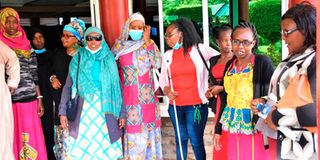Seek elective posts in 2022, women with disabilities asked

Women living with disabilities in Isiolo during a workshop in Isiolo town on July 1, 2021. They were challenged to go for elective posts for better representation and inclusion.
What you need to know:
- Women living with disabilities in Isiolo have been challenged to vie for elective posts in the forthcoming General Election for better representation.
- Valentine Nyaguthii of Pastoralist Gender Initiative, appealed to the community to discard beliefs that portray women with disability as weaker, which impedes their involvement in politics.
Women living with disabilities in Isiolo have been challenged to vie for elective posts in the forthcoming General Election for better representation.
Ms Valentine Nyaguthii of Pastoralist Gender Initiative, a community-based organisation, said women who are challenged have an equal role in politics and should rise above retrogressive cultures and engage.
She said seizing the opportunity would ensure their inclusion on important issues of interest to the special group.
“The women should rise above the challenges and go for the elective posts to push for interests of the special groups,” Ms Nyaguthii said.
She lamented that Persons living with Disabilities (PWDs) were underrepresented in the county government.
Speaking during a training workshop for the group organised by Women Challenged to Challenge (WCC) in Isiolo town, Ms Nyaguthii, who was among the facilitators at the event, called for joint efforts from all in supporting PWDs vying for various positions in the forthcoming election.
The constitution demands that two-third of Parliament representation be women.
Outreach educative programs
Ms Amina Ibrahim, who is visually challenged, expressed need for continuous outreach educative programs to break the barriers that continue to limit their involvement in issues including development and politics.
“There is need for women like me to be continually empowered so that they seize the available opportunities and push for the interests of the others,” Ms Amina said.
Among the challenges they face, she said, include lack of information on available opportunities, discrimination during recruitment and appointments and award of tenders.
Another participant Ms Shuke Guyo said time had come for men to reciprocate the political support that women previously offered to them.
“We (PWDs) should be given a chance to lead and head departments. Women too, should support their own,” Ms Guyo, a teacher at Isiolo Boys High School who uses walking aid, said.
Political ambitions
Ms Nyaguthii appealed to the community to discard beliefs that portray women with disability as weaker, which impedes their involvement in politics.
“People should know that PWDs are intelligent, visionary and gifted like other leaders with no disability and give them a chance,” she said while calling on elders to support the group’s political ambitions.
Women Challenged to Challenge Programs Officer Vera Robi said the organisation was undertaking capacity building and advocacy in Isiolo, Kirinyaga, Narok and Trans Nzoia counties to ensure women go for political seats and avoid overreliance on appointments.
“We also want them (women with disabilities) to take leadership positions even at the communities that they come from,” Ms Robi said adding that the advocacy will protect and promote rights of women with disabilities.





